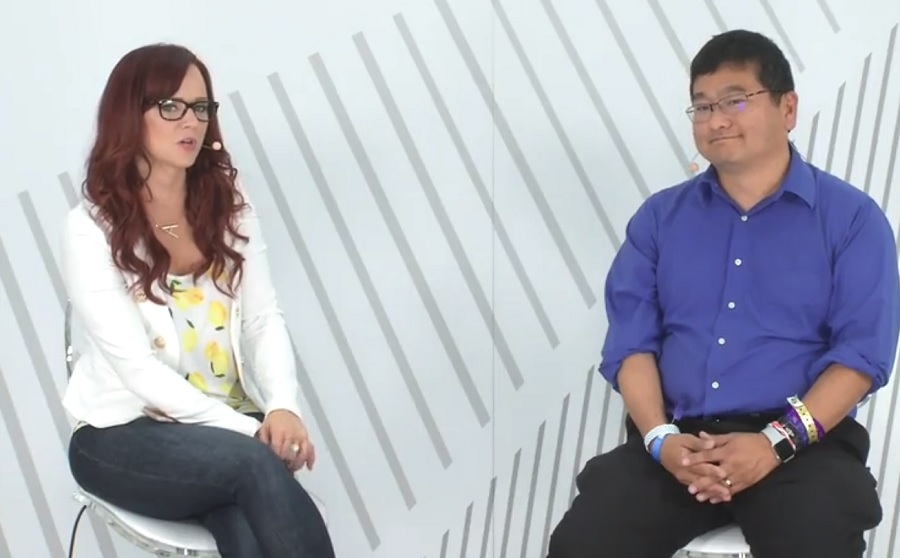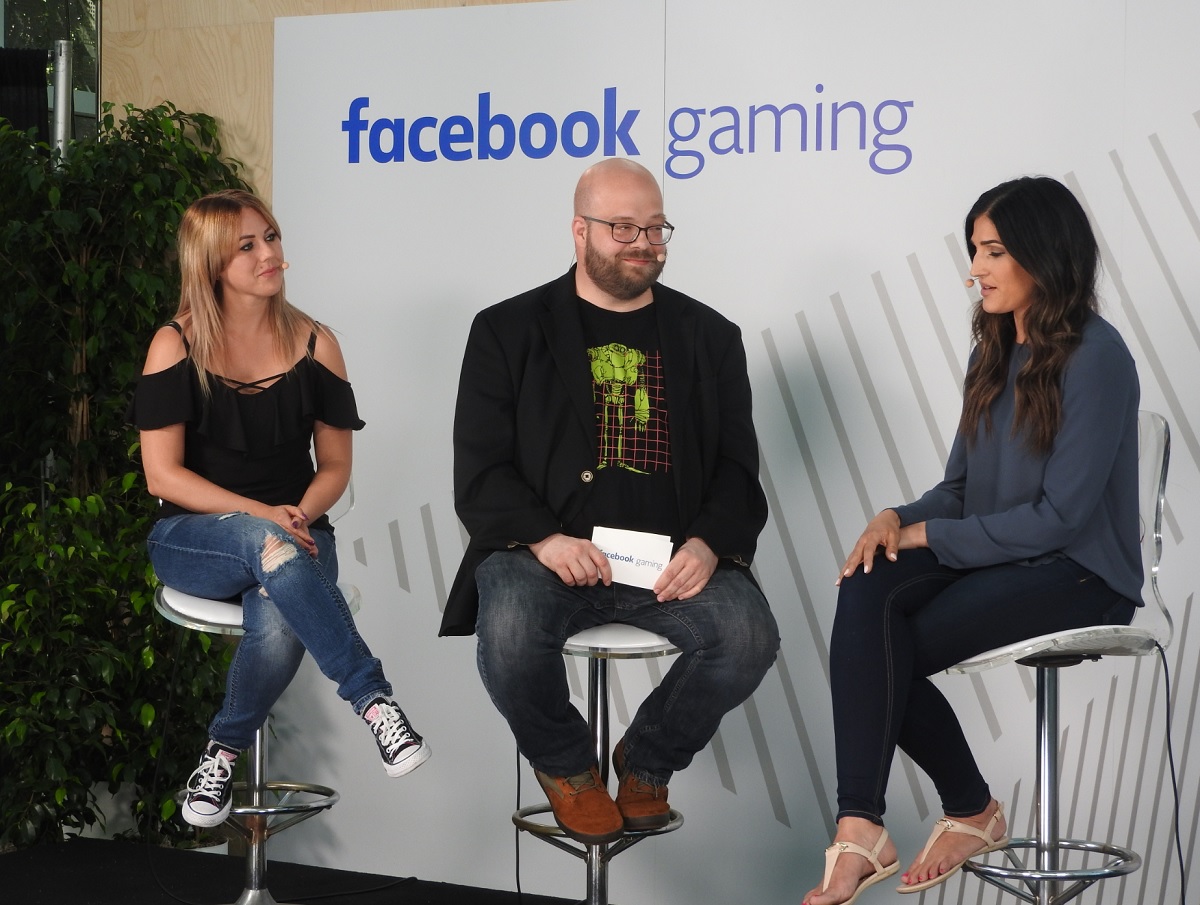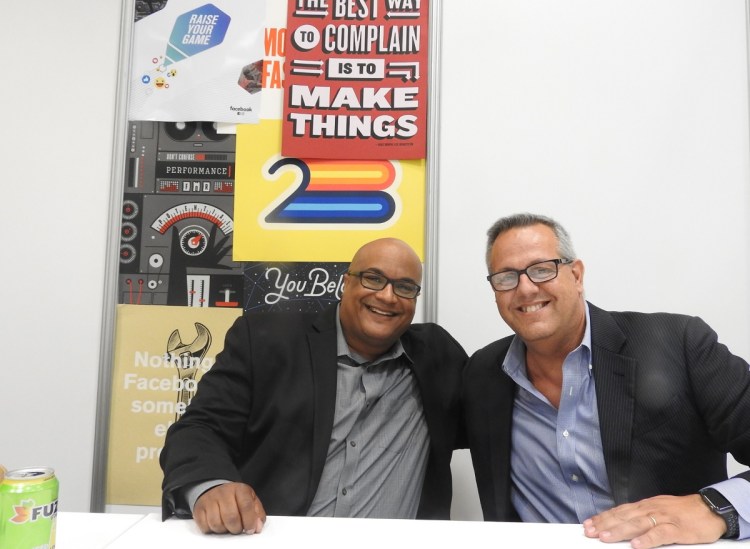Facebook isn’t a game company, but it knows a lot about games and gamers. During last week’s Electronic Entertainment Expo (E3), the big video game trade show in Los Angeles, the company released data that showed the biggest interest in E3 was in the U.S. The most discussed games were Resident Evil, Fortnite, and Super Mario. Sony was the most-talked about game company, and The Last of Us Part II had the most buzz going into the show.
And another thing it has learned is that gamers want more immediate gratification. E3 was once a retail show where companies showed off games that people could buy six months later. Now it’s about getting a share of billions of eyeballs during the show and getting gamers to take some kind of action. It’s about live broadcasts of events such as esports tournaments or game reveals.
The company had a couple of booths at E3 where it streamed live broadcasts with influential hosts such as Andrea Rene (I went on stage with her for an E3 recap), Darkness429, MelonieMac, and StoneMountain64. It also touted its Women in Gaming initiative, and it hosted live panel discussions at E3 Coliseum.
I spoke about these matters at E3 with Leo Olebe, global director of games partnerships at Facebook, and Franco DeCesare, head of console and online gaming at Facebook. Here’s an edited transcript of our interview.

Above: Andrea Rene and Dean Takahashi on Facebook Live at E3 2018.
Leo Olebe: It’s a big year, a big E3 for Facebook, Facebook Gaming, all the different areas that we’re involved in the gaming community and the games business. We have our first ever creator presence on the show floor, which is a big deal. January we announced our Facebook Gaming creator program, and then just last week we talked about FB.GG, having a great place for people to go consume gaming video, screenshots, all sorts of games content. We have people in our creator booth, and we have a presence in the west hall lobby, and of course up here in the business center.
We’ve announced a lot of things in the last couple of weeks, but at the end of the day it’s just being more committed than ever. Every year we try to do as much as we can to give people the power to build community and bring them closer together. That’s Facebook’s mission. In our context we’re doing it with games.
Franco DeCesare: We’re also partnered again with the E3 Coliseum and the ESA. All of the panels have been streamed on Facebook. We’ve also integrated with our Women in Gaming initiative, which has a presence on the show floor. We’ve tried to integrate everything across the board. We have a panel on Wednesday night that Andrea will moderate, telling the story of women in the industry, how they’re thriving and driving more diversity in the industry. We’ve worked to talk about storytelling in the industry and how more women characters are part of that.
GamesBeat: It seems like more immediate gratification is part of the show. It used to be that, as a retail show, you were getting people excited about buying something six months later. Now you have live downloads right now, like Fortnite for the Switch. Everyone’s succeeded in bringing the eyeballs to the show, and then you want to do something with that, some action, whether it’s a download or an esports tournament or 100 hours of programming.
DeCesare: I think it breaks down to the conversation data we’re looking at. One thing that’s interesting, if you look at what we captured a month ago and what we’ve seen leading up to E3, and probably we’ll see what comes after—there’s a lot of franchises and games that are perennial. This is an industry that used to focus on each year’s games. Now you see that Minecraft is still up there. Fortnite is still up there. PUBG is still up there. These are games that are played ongoing, all the time. We see the community talking about them on our platform.
At the same time, it’s good to see some of the newer announcements and reveals in the last 48 to 72 hours still coming up. There’s still an ability to grab the conversation and make a splash. We saw Kingdom Hearts and Fallout on the list. But it’s interesting to see these gaming brands stay part of the conversation in the community.

Above: Britney Brombachter (left) interviews Maja Moldenhauer of Studio MDHR.
Olebe: It feels like future is here. That future being community at the heart of almost every single conversation and every single promotion we’re seeing on the show floor. To your point, no longer having to wait for those things, and understanding that what consumers want today—I want it on my device. I want to play what I want. I want to watch what I want. I want to do it all when I want to. It puts the community at the forefront, which is great for Facebook and Messenger and Instagram and all the things we’re doing in any number of ways.
It feels very familiar as well. I think of a lot of context around MMOs. I worked on MMOs for a long time. Those core community elements, letting the community lead the way with their feedback and ideas and motivations—it’s just a really exciting time.
GamesBeat: Do you feel like this plays into your plans, or do you have more things to do to accommodate that need for immediate gratification?
Olebe: I think that it’s a great time to be a part of Facebook Gaming, and a great time to be a part of Facebook and Instagram and Messenger and Oculus and all the companies we have that are thinking about bringing content to the masses and engaging with people. We’re in the right place at the right time, but our journey, as we always say, it’s only one percent finished. There are more things to build, more things to focus on.
It’s a continuation of our core mission and what we’re trying to do overall, which is make it a lot easier for communities to engage with each other and support, promote, show off the games they love and care about. I feel great about it. As a company, we think this is a fantastic time to be in games.

Above: You can see what the best seats in the house look like with Oculus Venues.
DeCesare: You see especially with our focus on content creators, the dynamic between content creators, influencers, and publishers, how much they push back. They try to come up with ideas and new things. How do you reward your community? A lot more publishers are thinking that there’s more to give. In-stream rewards is an example, where we facilitate that dynamic by giving a certification in a game and connecting an IP and a publisher with a community through those creators.
All of them are basically young entrepreneurs. They’re partnering with the publishers to constantly evolve. It’s made incredible progress in how dynamic this industry has been. The last two years, really, we’ve seen this incredibly accelerate.
GamesBeat: There’s talk again that the consoles might go away and we’ll go over to cloud gaming, playing on any platform. What do you think of that? Do you really care, as Facebook, which way that goes?
DeCesare: I don’t think we care? I think what’s important is that the gaming experience continues to be pushed forward and become more varied. Part of our family is Oculus, so we do have a major push on VR and AR. But the beauty of this industry, when you come around and look at the conferences over the last three days, is how broad the variety is. If the console evolution becomes a conduit to a different type of experience, they’ll continue to thrive. But the gaming community is ready to move toward whatever works.
One thing I’ve found fascinating at a lot of press conferences is how much publishers are thinking cross-platform. You see it with Fortnite, with Bethesda. You move from console to PC to mobile and the game interacts in different ways. Your progress can be transported anywhere. That’s phenomenal for us, because it talks to that community at the heart of it.
Olebe: In terms of levels of interaction and engagement that people have—how they get access to the content, what device they’re playing on, that doesn’t even really matter, as long as they have the ability to engage and share and participate in a conversation. We’re mostly agnostic to how people enter the gameplay experiences. We want to make sure they’re having the best gameplay experiences possible and it’s easiest for them to share those and engage with the people they’re playing with.
 GamesBeat: You guys had the whole Cambridge Analytica problem. Has that had any fallout for Facebook Gaming?
GamesBeat: You guys had the whole Cambridge Analytica problem. Has that had any fallout for Facebook Gaming?
Olebe: We take privacy, of course, very seriously. The company has announced a lot of different things we’re doing as a result of Cambridge Analytica. Someone could probably provide you with the long list. If anything, we have our community standards and policies. We’re focused on inclusivity and making sure that we have a non-toxic environment. It’s something we consistently are thinking about and working toward, making sure we can do better.
DeCesare: We’ve been very public about this. Like the journey of building this new solution, this is never going to be finished. As we learn about bad actors using our technology in the wrong way, we constantly look at it and improve it.
One thing that’s been really exciting and positive has been—in the gaming industry, our partners have been really willing to cooperate with us. Sometimes certain things in our policy might actually make their marketing tools slightly less efficient, but they understand the bigger picture. They want to protect the gamer community and the consumer as much as we do. There’s a real commonality of intent. We’re looking very much along the long term, but we’ve been moving as fast as we can from the beginning.
GamesBeat: The push for women in gaming, I don’t know if that created pushback for you guys.
DeCesare: We’ve not experienced that. We’ve seen women in the industry embracing the opportunity in an incredible way. We’ve seen publishers being really willing to partner with us. In our panel we’re doing at the Coliseum, Blizzard will participate. Xbox will participate. They just announced Gears of War with a woman protagonist. We’re looking at it from an industry level, at opportunities from a work force perspective. We’ve only seen tremendous enthusiasm.
Olebe: This is such a powerful moment in the games industry, something that’s so important to not only Facebook, but every gaming company and the industry as a whole. People aren’t pushing back on our stuff, and they’d be entirely ridiculous if they were. [laughs] I’m being aggressive in my statement because I’m passionate about inclusivity. It’s extraordinarily important.
Women have made an incredible contribution to games. They’ve made an incredible contribution to so many aspects of our industry, our technology, everything we do. It’s about time we celebrate women in games the way we should have for a very long time. If anything, we all need to get together and be a lot more aggressive about saying, “This is the time. Let’s move things forward in a powerful way.”
GamesBeat: One thing I always think about gaming that’s strange—you reach billions of people. Gaming grew up in a subculture with a very limited demographic at first, teen males. It grew big, into a mass culture, and in some ways they should celebrate that. But they also want to pull it back into being a subculture.
DeCesare: At Facebook very often we talk about this concept of personalized marketing at scale. An experience that’s very personal to you, but is also very mass. I think that’s part of the beauty of this industry, that it is mass, but that doesn’t mean everything has to appeal to everyone. There’s a lot of variety of formats, gameplay styles, and types of experiences. You can find a niche that’s still incredibly rewarding. A lot of the games here are very specific in their appeal, but at the same time, the sum of all of it is this very large community. Another thing we’ve seen very consistently now as we look at the conversation is that women, even around the weekend of E3—39 percent of the conversation is women.

Above: Women in Gaming will tell the stories of the game industry’s female leaders.
GamesBeat: Everyone has something for them. I feel like there’s a lot of manufactured outrage.
Olebe: It’s a beautiful thing, that our industry and gaming is growing bigger and more broad and being recognized and welcomed on a global scale. That’s a great moment for games. I can think of several different examples, whether it’s literature or movies, where you go through this transition phase where people are really protective. “This is my thing.” Now all these people are coming into “my thing.” What does this mean to me?
There are two ways to react. One is that you can be really closed and get small and insular, or you can be open-minded and understand that there’s a reason why 80-plus percent of teens play games today and form relationships with each other through the games they’re playing. Gaming so ubiquitous. It’s part of the core nature of how kids are growing up today.
I think of my own kids and your kids as well, how they interact and engage with games at all ages and all levels. My kids had iPads in their hands at two years old. We have to be more welcoming and accepting, because things are going to change. “Why isn’t this the games industry of old?” It’s because that’s old. Things are new now. They’re more interesting and more engaging.
DeCesare: I grew up with gaming as a subculture. These kids are growing up with gaming being absolutely in the mainstream. It’s a very broad form of entertainment. You look at Fortnite and the confluence of gaming, sports, entertainment, music, hip-hop. It’s all coming together. You’ve got Ninja in the middle of all of these people playing games together.
Olebe: We’re finding more and more people that are active on Facebook in groups of all different kinds. There are hundreds of thousands of groups talking about games and engaging with each other on a very consistent basis. Innumerable conversations on news feed, on FB.GG with all the streaming stuff. There’s another thing we could talk about with all the gaming stuff happening on Instagram, how people are sharing and celebrating stuff. It’s an amazing time to watch these conversations. We’re seeing phenomenal engagement now from the gaming community.

